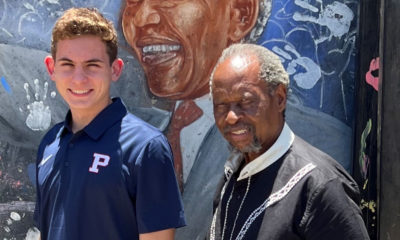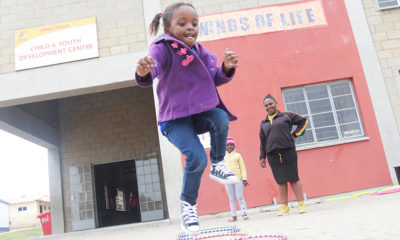
Community

Afrika Tikkun celebrates 30 years of social impact
Exactly 30 years ago, two Jewish men decided to launch an organisation to improve the lives of all South Africans. They were the great philanthropist Bertie Lubner and then Chief Rabbi Cyril Harris.
This organisation, now known as Afrika Tikkun, has for three decades enriched the lives of more than 325 000 young people; served 25 million nutritious meals; distributed more than 77 000 food parcels; provided social-support services to about 105 000 families; and conducted more than 15 000 primary healthcare interventions. It has become one of South Africa’s leading youth development non-profit organisations.
Today, Afrika Tikkun provides education, health, and social services to disadvantaged communities across South Africa, and is assisting more than 40 000 children and youth across the country. The organisation has a holistic approach to the development of young people from early childhood to contributing members of society.
“I work in the worst circumstances with the best of people,” says Marc Lubner, the Executive Deputy Chairman of Afrika Tikkun and son of the late Bertie.
“Most people who work in the organisation aren’t here for the salary,” says Lubner, “They’re here because they truly believe that this organisation can and is making a difference. Whether it’s the board members who give of their time pro bono, or the staff who could be earning much more in the commercial world. These are individuals who care about the country and the people in it.”
Lubner says that when his father and the late chief rabbi started it, “It was a vanilla charity in the sense that it was driven by a desire to do good things in numerous areas around South Africa.
“The principles were driven by what different communities needed because my dad and late Rabbi Harris saw how some communities were struggling.
“It came from the idea that the word tikkun [amending] would be used to start an initiative that would harness the energies of those committed to building a new South Africa,” Lubner says. “Rabbi Harris said that the concept of Afrika Tikkun was twofold – ideological while also ‘brutally practical’.”
Lubner says his father had taken the business acumen he acquired in the family business – PG (Plate Glass) Group – and applied it to his philanthropy. “My father’s philosophy was that in any organisation, for it to be sustainable and well run, it needed 10 principles – his 10 commandments. He applied the same principles or ‘commandments’ that he had learnt in business to the running of Afrika Tikkun. “Celebrating this milestone of three decades means that we’ve transitioned from being just a charity organisation into what is hopefully an important player in terms of social impact, uplifting young people’s lives in townships, giving them hope, giving them a sense of future, giving them opportunities. It marks a moment when we’re going to be much more actively involved in informing policy and helping to develop strategy for the changes needed.”
Lubner says that in creating the organisation, his father and Harris would bring into the fold people they believed could help them push the organisation further. These included the Lubner family; financial manager Arnold Forman, Afrika Tikkun’s non-executive director; Anne Harris, the late chief rabbi’s wife.
President Nelson Mandela praised the organisation for its work after a visit to one of its projects in Orange Farm in 1999, and offered to become the organisation’s patron in chief.
“Afrika Tikkun projects demonstrate practically and sustainably what can be done with limited resources, great commitment, and passion,” Mandela said. “The challenge to reach all the disadvantaged people of South Africa remains a paramount one. We need all the resources, both human and financial, to address these challenging tasks. I believe Afrika Tikkun represents the best of what civil society can offer in partnership with the government’s considerable efforts. Afrika Tikkun has proven that it can reach sections of our disadvantaged population at grassroots level. It therefore provides physical help, as well as giving hope and dignity to recipients.”
In the first decade of the organisation, Lubner witnessed the amazing work the organisation did, but it was only when he came into the fold as chief executive officer 19 years ago that he truly started to understand its impact.
“I decided that I wanted to spend a couple of years with my father in the activities of Afrika Tikkun,” she says. “But I certainly didn’t anticipate that it was going to be my life path. I came from a commercial background. I had been with the PG group, my family group, for 11 years, and then I spent time building my businesses and so I always thought I was going to be a businessman. I was just going to take a few years off to try and bring some business principles to Africa Tikkun and share time with my father, who had been diagnosed with a heart condition at that time.”
When he came onboard, Lubner had to find a model that could be sustained once his father and Harris passed on. “We were feeding people, but so what? If you’re going to feed them forever, you’re not changing anything,” he says.
This is why it was important that the organisation branched out into early childhood development through its early child and child and youth programmes. The organisation also helped youngsters get through school and into the job market and working environment.
“It’s effectively a cradle-to-career model,” Lubner says, “which means we start with children at an early age where we teach them values, then teach them to believe in themselves as they grow older and take responsibility for themselves, and then we help them with their selection of subjects for school and towards career pathways.”
Afrika Tikkun’s programmes now consider the needs of young individuals across different stages of their lives, from preschool to high school, followed by a post-matric programme offering jobs skills training and assisting with job placements.
“Our programmes culminate in the development of talented and disciplined youth, instilled with good values from an early age. These individuals are brimming with potential and ready to meet in-demand skills needed from South Africa’s labour pool,” says Onyi Nwaneri, Afrika Tikkun’s group chief executive.
In spite of Afrika Tikkun’s achievements, it believes significant progress still needs to be made to address, among other things, the country’s unemployment rate of 33% – the highest rate globally – and even more among the youth. Afrika Tikkun has partnered with government’s Youth Employment Service (YES) programme to create substantial work opportunities for unemployed youth through its Head Start programme.
“Investing in skills development and vocational training equips the youth to navigate the demands of an evolving global economy. The YES initiative seeks not only to improve the lives of young people but to assist in the expansion of enterprises in which they are employed. Placement into well-suited employment requires an investment over time that provides a seamless transition from infancy to career,” says Nwaneri.
Lubner says, “Our most important achievement is that we partner with various organisations because we’re not hung up on our ego, we don’t have to own and control everything because we realise it’s important that we work collaboratively with other organisations to get young people into jobs.”










